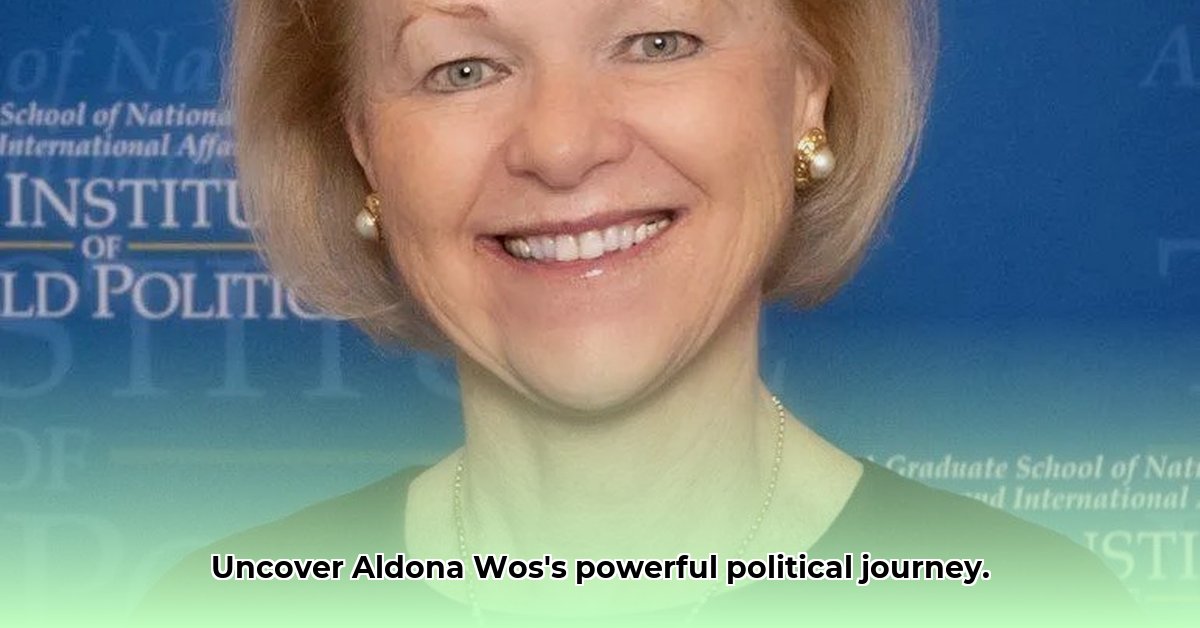Aldona Wos’s journey is a remarkable story of a physician who transitioned into the world of politics, significantly influencing healthcare. From her medical practice to high-ranking government positions, this article delves into her career. We will analyze her impact on healthcare policy, the challenges she encountered with technology projects, and her collaborations with key figures. Additionally, we will address the controversies she faced and her ability to navigate the pressures of politics. From her dedication to Holocaust remembrance to her leadership roles in North Carolina and beyond, we’ll assess her lasting contributions to both US politics and healthcare sectors. For more on impactful women in leadership, see this profile of another leader.
Aldona Wos: A Life in Public Service and Politics
Aldona Wos’s career represents a compelling narrative—a fusion of medical expertise, strategic political decisions, and a substantial impact on healthcare and US foreign policy. Her evolution from a practicing physician to holding prominent roles within the US government provides a captivating study for those interested in the intersection of medicine, policy, and political environments, offering insights into healthcare reform. It’s a story marked by both notable achievements and considerable controversies, resulting in a legacy that continues to be debated and scrutinized. What motivated such a significant career shift, and how effective was she in bridging these two distinct worlds?
From Doctor to Decision-Maker: A Career Shift
Wos began her professional life in medicine. After a distinguished career as a physician, she transitioned into the complicated realm of public service. This wasn’t merely a career change; it symbolized a strategic effort to utilize her medical knowledge and skills to influence healthcare policy on a broader scale. This decision underscores her ambition and her confidence in using her expertise to make a difference beyond individual patient care. It’s an uncommon path, spotlighting the unique viewpoint a medical professional can offer to government. Was her medical background an asset or a liability in her political career?
Leading North Carolina’s Health Department: Achievements and Challenges
During her time as Secretary of the North Carolina Department of Health and Human Services (NCDHHS) from 2013 to 2015, Wos oversaw a department with over 18,000 employees and a budget of approximately $20 billion. Her tenure was marked by both significant achievements and strong criticisms. Wos declined her $128,000 salary, accepting a symbolic $1 payment instead. She also pointed out budgetary issues in the previous administration.
One notable area of focus was overhauling the state’s Medicaid system, which she and Governor Pat McCrory deemed “broken.” The proposed plan involved bringing in private companies to function as insurance companies for Medicaid recipients, offering them choices among various statewide insurance plans. However, this plan faced criticism from healthcare professionals, who worried about the potential for out-of-state and for-profit providers to gain a significant foothold in North Carolina, possibly at the expense of local, non-profit providers. These concerns underscore the complex considerations involved in healthcare reform and the differing perspectives among stakeholders.
The implementation of NCTracks, a system for managing Medicaid billings, and NC FAST, intended to streamline food assistance programs, encountered substantial delays and technical problems. These issues directly affected individuals relying on these programs, causing delays in receiving crucial benefits such as Medicaid reimbursements and SNAP (Supplemental Nutrition Assistance Program) benefits. This triggered widespread public criticism and federal investigations, including scrutiny from the United States Department of Agriculture (USDA) regarding delayed SNAP cases. While the investigations did not reveal any proof of criminal behavior, the unfavorable publicity and public discontent undoubtedly tarnished her record. This period serves as a clear reminder of the potential challenges of large-scale IT projects in government, particularly those directly impacting vulnerable populations:
- Sought to overhaul the Medicaid system, facing criticism over privatization concerns.
- Faced delays and technical problems with the implementation of NCTracks and NC FAST systems.
- Underwent federal investigations regarding the handling of SNAP cases, which found no criminal wrongdoing, but resulted in negative publicity.
A 2014 report by the North Carolina General Assembly highlighted the need for better oversight of IT projects, stating that “inadequate planning and risk management contributed to significant cost overruns and delays (N.C. General Assembly, 2014).”
Wos resigned from her position in August 2015 and was replaced by Rick Brajer.
A Near-Appointment to Canada: An Unfinished Chapter
Wos’s ambition extended beyond state-level government. In 2020, she was nominated for the position of US Ambassador to Canada by President Donald Trump. This nomination attracted considerable attention, representing a significant step onto the national and even international stage. However, the nomination was eventually withdrawn. The lack of complete clarity surrounding the withdrawal adds an element of mystery to her story, leaving room for various interpretations and discussion among political analysts.
Prior to her nomination, Wos served as the U.S. Ambassador to Estonia from 2004 to 2006. During her time as ambassador, she played a role in organizing President George W. Bush’s state visit to Estonia in November 2006. For her efforts in fostering cooperation between the US and Estonian police forces, she received a special police medal from the head of the Estonian Police, Raivo Aeg.
A Balancing Act: Political Involvement and Public Service
Wos’s strong dedication to Holocaust remembrance is a consistent and noteworthy aspect of her public image. She was appointed to the U.S. Holocaust Memorial Council by President George W. Bush in both 2002 and 2004. Her father, Paul Zenon Wos, was a member of the Polish Home Army during World War II and a recipient of the “Righteous Among the Nations” medal from Yad Vashem.
However, her active involvement in Republican politics, including fundraising activities for various candidates, has received both praise and criticism. This represents a classic example of the potential conflicts inherent in navigating the intersection of personal political beliefs and the demands of public service. There’s a delicate balance to be struck between expressing one’s political views and maintaining the impartiality necessary for effective governance. Some argue that her political activities strengthened her ability to advocate for her beliefs within the system. Others, however, might suggest that they compromised her ability to serve all citizens equally, regardless of their political affiliations. This remains a subject of ongoing debate. Could clearer guidelines for political involvement by public servants mitigate such controversies in the future?
The Enduring Legacy of Aldona Wos
Aldona Wos’s career provides a rich and multifaceted case study, offering valuable lessons for aspiring public servants, healthcare professionals, and policy analysts alike. Her story demonstrates the considerable challenges involved in translating theoretical expertise into effective policy-making, particularly within the often-turbulent world of American politics. The complexities of managing large-scale government projects and the difficulties of balancing personal political beliefs with the responsibility of impartial public service are highlighted in her experience. Her legacy, therefore, is not a simple one:
- Illustrates the challenges of translating expertise into effective policies.
- Highlights the complexities of managing large-scale government projects.
- Raises questions about balancing personal beliefs with public service responsibilities.
According to a 2018 study by the Pew Research Center, “public trust in government remains near historic lows, highlighting the importance of ethical conduct and transparency among public officials (Pew Research Center, 2018).” Her story continues to generate discussion and prompts ongoing analysis regarding the intricate interplay between policy, politics, and effective governance. It highlights the importance of ethical leadership.
How to navigate political controversies in a public service career
Key Takeaways:
- The increasing polarization of politics significantly impacts the workplace, potentially leading to biases in decision-making.
- Balancing personal freedom of expression with maintaining a productive work environment is crucial for public servants.
- Younger generations expect companies to take stances on social issues, increasing complexity.
- Legal protections against discrimination don’t explicitly cover political affiliation, requiring robust company policies and employee responsibility.
- Effective strategies include clear guidelines, training, and fostering respectful communication to mitigate political tensions.
Aldona Wos: A Career Navigating Political Currents
Aldona Wos’s career provides a compelling example of maneuvering through the complexities of political life within public service. Her journey, characterized by notable achievements and controversy, provides lessons on how to navigate political controversies in a public service career. Did she always handle challenges effectively? That’s a question open to discussion, but her experiences offer a valuable framework for examination. Her approach provides relevant examples.
From Academia to Government: Early Successes
Wos’s background in medicine and academia established a solid foundation for her subsequent roles. She earned her M.D. at the Warsaw Medical Academy and completed her internship and residency in Internal Medicine, including a fellowship in Pulmonary Medicine, in New York City. Her expertise in healthcare policy, refined through years of research and practice, positioned her for influential roles within the North Carolina state government. Her initial appointments were generally successful, focusing on efficiency and reform. This early success demonstrates the advantages of entering public service with a relevant and strong skillset. It also underscores the importance of building a good reputation for competence before entering highly politicized environments. What specific skills from her academic background proved most valuable in government?
The North Carolina Department of Health and Human Services: A Turning Point
Wos’s tenure as Secretary of the North Carolina Department of Health and Human Services was a turning point. During this time, she implemented some initiatives that were widely applauded. However, this period also saw increasing criticism, particularly surrounding the rollout of new IT systems for Medicaid and food assistance programs.
- How to Produce Electricity at Home for Energy Independence - January 29, 2026
- How To Create Electricity At Home For Energy Independence - January 28, 2026
- How to Make Electricity at Home Using Renewable Energy Sources - January 27, 2026
















